In This Episode << SLIDE LEFT TO SEE ADDITIONAL SEGMENTS
Conversion, Part 1
LUCKY SEVERSON, guest host: The famous religious conversion stories are full of high drama: Saul’s vision on the road to Damascus or Constantine’s fiery cross in the sky. Modern-day religious conversions can seem tame by comparison, but tolerant attitudes toward faith-seeking have made them more common. Still, choosing a new religion is usually a major decision — for converts and their families. In the first of a two-part series, our reporter, Stephen Dubner, himself a convert and author of the book TURBULENT SOULS, looks at the experience of John Curry, principal of a school for at-risk students in New York.
JOHN CURRY: I grew up in St. Louis, in the Bible Belt. My parents talked about religion constantly, they were in a Methodist Church … they considered themselves born again and were very strict theologically.
RUTHIE PADOWER: I experienced Judaism in two opposite ways. At home, it was this very pleasant, defining part of who we were and then we lived in a town that was not heterogeneous at all. It was purely Christian, and so, I grew up very uncomfortable with my Judaism in that setting.

STEPHEN DUBNER: You met in college. Was the fact that you came from different religions an issue?
MS. PADOWER: Once we started thinking about living together and maybe marrying and having children, it was an issue because I wanted to raise my children Jewish, and I didn’t want to raise my children in a house where Christmas was celebrated.
CURRY: Ruthie, at one point, said, well you can have a Christmas tree if you need it to be in the house … but it will be your Christmas tree and the children and I will just consider that daddy’s, and I thought, I’m gonna be sitting in the corner with my little Christmas tree. It was just ridiculous, and then I thought, well I’m gonna be like a stranger in my own family, and I couldn’t really see how to resolve it at the time.
DUBNER: Did you think at all back then about converting?
CURRY: I think I did in vague ways, but I couldn’t really imagine it. Not that it was something I would hate to do, but I guess I felt that [by] even saying it, I was gonna feel like a wannabe for someone else’s culture.
LEWIS RAMBO (Author, UNDERSTANDING RELIGIOUS CONVERSIONS): The experience of conversion, I think, at its deepest level, is a profound and pervasive reorientation of one’s entire life. Starting in many cases with self image — Who am I as a human being? — to, Who is God? What is the nature of reality?
RABBI MAGGIE WENIG: I think it’s as significant a decision as choosing a partner to spend many years of your life with or deciding to have a child.

DUBNER: We are probably in a country and at a time when conversion is at an all time high. Conversion is rampant. Is that good?
RABBI WENIG: I would have to say yes. But I believe that human beings long for meaning, a relationship with God, community, and are feeling an emptiness.
DUBNER: Tell me about this Christmas season visit to your sister’s house in Seattle.
CURRY: At this particular Christmas service, they took a baby out of the congregation and put it in the manger for a Christian ceremony.
MS. PADOWER: And that night, I had a dream that I had a child and that they took my baby out of my arms and used him or her for their Jesus, and we couldn’t get him back.
CURRY: I’d always had this idea that somehow I wanted Christmas in my family’s life because, somehow, that would bring happiness to my children. And I had this horrible experience: my mother, sister, and father not getting along; me feeling watched by my parents to see if I would go up to the altar and profess my faith in Christ; conflicts around our children. … I felt like there was this whole ball of tension and things I didn’t know how to resolve. I was lying in bed, and I thought, you know, if I converted to Judaism this would just go away. And I said to Ruthie, “Maybe I should convert,” and she said “Why would you want to do that?” My fear was that she would say, “That’s wonderful,” and I would feel this responsibility to follow through, and instead, she just put the breaks on.

DUBNER: Did you think if you did convert how your family would react?
CURRY: That was another thing. It would be like a bombshell, … no longer being Christian was … one, and this would be even bigger.
DUBNER: A midnight epiphany, on Christmas Eve. That’s what led John Curry and Ruthie Padower from one minefield — intermarriage — to another — conversion. It used to be a rarity, but these days it’s a staple of American life. But that doesn’t mean it’s simple. A religious conversion winds its way into every corner of one family’s life.
CURRY: So, I was looking for something, and the idea of converting to Judaism, I think, subconsciously — maybe partially consciously — provided an option of rediscovering … let’s say spiritual text, the Bible … and as I continued with my study, I found more and more things that I could claim in a way that were very compelling to me. And I think it started vague, and it became more and more specific and more and more exciting for me and … helped me grow in my knowledge of Judaism.
RABBI WENIG: In the past, a lot of people would talk about conversion as being sudden and dramatic. I think the influence of the conversion of Saul of Tarsus to … Paul the Apostle is paradigmatic, whether people … know much of the Bible, whether they’re Christians or Jews or whatever.
Everybody knows about Paul. But I think that most of the research now shows that conversion, while having dramatic events within it, is a process over time.

DUBNER: John immersed himself in Jewish learning. And it was John who became the architect of the family’s Jewish practice.
CURRY: I think, initially, when I was considering converting, what I wanted to give my kids was a history and a tradition that they could claim as their own. I couldn’t imagine having them with no spiritual tradition at all in their lives, and I wanted to be part of that.
MS. PADOWER: I think of him as a profoundly Jewish Jew. Yeah. I don’t at all think of him as a convert. It feels very — I guess the term convert, to me, sort of seems like it’s dipped in something, and he’s … from the core out, you know?
DUBNER: For now, John and Ruthie are finding a balance to their religious observance. What will be the ultimate effect of John’s conversion? That won’t be known for at least a few years, until the next generation has its say.
CURRY: My daughter has known that I’m a convert, she met my father who passed away, and my mother, and knows how Christian they are. She has a sense that things can be mutable and changeable and understands that I’m Jewish now and doesn’t really question that. I wonder if that also gives her a sense that she’s changeable. I guess one of my worst fears is that she’ll convert at some point. She expressed an interest in Christianity, although I think she has a Jewish identity pretty clearly.
MS. PADOWER: One of our children in particular loves going to services and follows along in the prayer book, even though he can’t read Hebrew. He’s a very ethical and compassionate six year old, and he’d be a fabulous rabbi.

